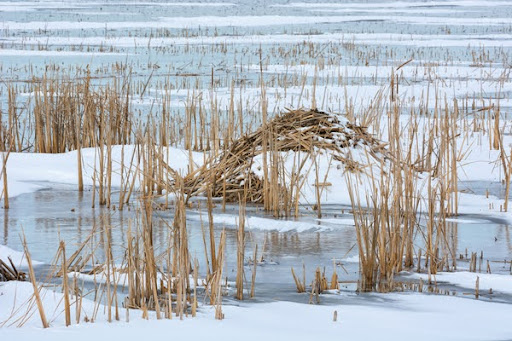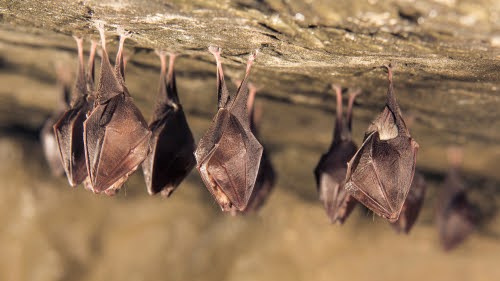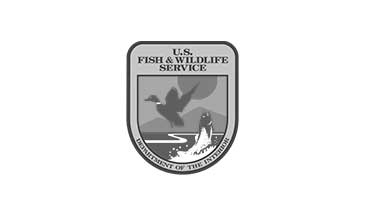Muskrats are semi-aquatic rodents that inhabit lakes, ponds, and streams across North America. They make their homes near bodies of water in rural and suburban areas. These animals look a lot like large rats with an intimidating set of claws, but they’re typically non-aggressive and more interested in finding food than interacting with humans. However, that doesn’t mean you want them damaging your pond, lake, or crops. Here’s everything you need to know about these mysterious rodents—and what to do if you’re dealing with a muskrat problem near your property.
What Are Muskrats? What Do They Look Like?
Muskrats (Ondatra zibethicus) are medium-sized rodents native to North American wetlands. Though not actual rats, they resemble members of the Arvicolinae subfamily, including voles and lemmings. Muskrats weigh between 2 and 4 pounds and are around 16 to 25 inches long, including their tails.
Their bodies are covered in two layers of dense, dark brown fur, and they have long, thin tails flattened for swimming. Muskrats are designed for water, with partially webbed hind feet that help them paddle and move quickly. They can even hold their breath underwater for up to 15 minutes—a crucial survival skill as they forage and escape predators.
Where Do Muskrats Live?
Muskrats prefer slow-moving or stagnant water, favoring marshes, ponds, lakes, and slow streams where there’s abundant plant life. They build dome-shaped lodges from mud, sticks, and vegetation near water banks, or burrow into the banks themselves.
Muskrats reproduce quickly, often forming large family groups and expanding their lodges with additional chambers and levels as their numbers grow. While muskrats generally stick close to home, they’re known to forage around ponds, lakes, and streams for food.
What Do Muskrats Eat in a Pond?
Muskrats are omnivores, but they primarily forage for plants, including roots, stems, leaves, and fruits of aquatic plants around their lodges. In ponds, they’re often spotted carrying vegetation back to their young. When plant life is scarce, muskrats may eat insects, shellfish, small fish, and even small mammals. Their preference for lush aquatic vegetation and slow-moving water makes ponds and marshy areas ideal habitats.
Do Muskrats Hibernate?
No, muskrats do not hibernate. As the weather turns colder, muskrats prepare their lodges by adding multiple levels to rise above the water level. As water freezes, they move to the upper lodge levels to stay warm and endure winter conditions. In particularly cold weather, muskrat families may huddle together to share warmth. Muskrats continue to forage throughout the winter, often digging through snow or using tunnels they’ve created to access food.

Are Muskrats Dangerous?
While muskrats are generally shy and prefer to avoid humans, they can become aggressive if cornered, startled, or threatened. Like many wild animals, they may bite in self-defense. Additionally, muskrats can transmit diseases, including rabies, so it’s best to keep a safe distance.
Though muskrats rarely attack humans, they can still cause problems, such as property damage from feeding on aquatic plants or burrowing into pond and lake banks, leading to erosion. If you have a muskrat problem on your property, it’s important to get help from a professional wildlife company before the damage becomes extensive and expensive!
How to Get Rid of Muskrats in a Pond
If you’re experiencing issues with muskrats burrowing near your pond or lake, or if they’re damaging plants and water banks, consider taking preventive measures. Here are a few effective strategies for muskrat control:
- Reduce Shelter and Food Sources: Trim back vegetation along pond banks and consider removing aquatic plants that may attract muskrats.
- Adjust Water Levels: Raising or lowering water levels in a pond may disrupt muskrat activity, encouraging them to relocate.
- Adding rip rap to pond edges is the number one way to prevent muskrats.
- Trapping: Trapping is an effective way to relocate muskrats. A professional wildlife control company, like Varment Guard, can perform muskrat trapping to ensure compliance with local regulations.
If you have a persistent muskrat problem or want to prevent future issues, Varment Guard can help. Our expert team offers wildlife control solutions to protect your property and maintain a balanced environment around your pond or lake.
What To Do If You Encounter a Muskrat: Contact The Professionals
If you see a muskrat near your property, maintain a respectful distance. Don’t approach or startle it, especially if it’s near its young or lodge. If muskrats are causing damage to your property, Varment Guard is here to help. We specialize in effective muskrat control solutions, so you can enjoy your space without worry. Reach out to us today for professional wildlife control and peace of mind.







